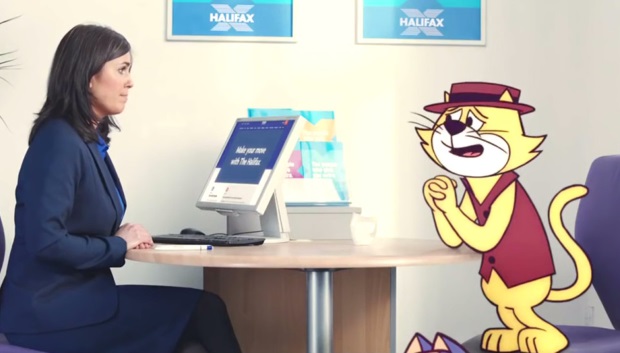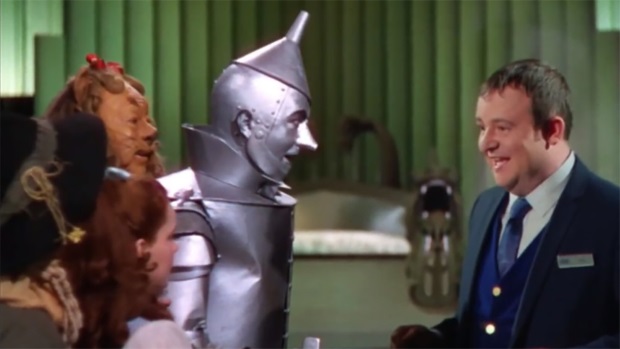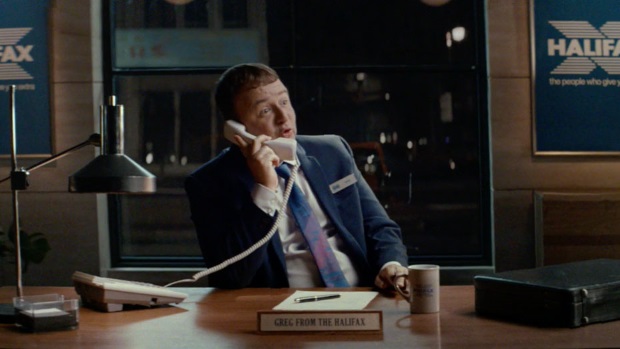Dear Halifax: please stop trying to sell me things using Ghostbusters
Has Halifax actually dug into the films and TV shows it's (badly) using to flog its mortgages?
It’s a miracle in a way.
Life on Earth requires us to be just the right distance away from our sun, to be only sporadically visited by substantial cosmic debris. Very specific circumstances are needed and be it divine intervention or be it sheer luck, it’s astonishing that we are here at all. Everything we do is tinged with this faint trace of the miraculous.
On the other hand, someone, somewhere decided that the best way to make us want to use a specific bank was to use Top Cat on the adverts.
This is one of the many human activities tainting the miraculous unlikeliness of our existence, like that t-shirt you were wearing when you threw up in 2004; people may say they can’t smell anything but you know no amount of washing can salvage it. This series of adverts for Halifax reminds us that we have taken fire from the gods but used it to light our own sharts.
The point of an advert is to promote something. In this case, Halifax Building Society. Halifax Building Society is part of Bank of Scotland who are in turn part of the Lloyds Banking Group. Halifax is now merely a trading name used outside of Scotland. They have chosen to promote their services by using a popular cartoon riff on The Phil Silvers Show – Top Cat may only have 30 episodes (made in the early 60s) but they were repeated frequently on UK TV until 2016.

Using homeless animated cats to sell mortgages may seem like a bit of a stretch, but there are a lot of signs that mining nostalgia works for people. Disney makes original movies, but they know that Star Wars has so many more benefits to them. Transformers’ makers knew they could rely on fans of the original toys and TV series. A new series of Star Trek means a ready-made audience. You can see why advertisers try to use existing properties to tempt us to the wares they’re hawking.
However, there is a crucial difference here. Those properties still require a story to be told, and people may reject it or embrace it based on their preference. There is usually an attempt – or at least a token gesture – beyond toyetic churn. An advert doesn’t have these requirements. This brings an element of risk.
It’s very hard to make an advert entertaining enough to overcome the story you care about being reduced to a way to sell things. In this case a children’s TV show is being brought in to make people consider Halifax for mortgages, as if mortgage advisers make their decisions based on the presence of Hanna-Barbera characters in marketing.
The Top Cat advert at least provided us with new material. Its canonicity may be up for debate, but it takes the fictional show into our world rather than the other way around. The other way around involves an advertiser watching The Wizard Of Oz and thinking ‘I mean it’s alright, but it doesn’t say who gives you extra.’
The Halifax/Wizard Of Oz campaign blurb contains the phrase “What better place to showcase Halifax’s expertise and heritage in helping the nation’s homebuyers than the Emerald City.”
A few things to unpick here.
The Emerald City – a fictional location from a film that does not dwell on the transfer of property ownership – is not the best place to showcase Halifax’s expertise in anything, except perhaps giving media groups flipping great wodges of cash.
Plus there’s no question mark. It really feels like there ought to be a question mark.

The high concept behind the advert is that the Wizard of Oz has gone out, leaving Halifax colleague Greg in charge to help Scarecrow, Cowardly Lion and Tin Man find their dream home, or in Dorothy’s case, find her way home. Except this puts Greg – as played by actor David Rees Talbot (Evan Evans in the Mark Gattiss-penned Doctor Who DVD extra Global Conspiracy?) – in the position of working for the Wizard of Oz. This is a man who is at best a humbug, at worst (according to a reliable-seeming musical I saw the other month) a dictator. Halifax is happy to ally itself with this liar and fraud, which is not what you want from a financial institution.
This campaign seems to have been generated from the line ‘There’s no place like home’, and then the assumption that seamlessly inserting a Halifax employee into The Wizard Of Oz to try to sell the main characters mortgages makes sense. None of them want mortgages Halifax, they’ve all been very clear with their stated aims. All this achieves is a less good version of The Wizard Of Oz and a demonstration of hard sales tactics frequently used by scammers on the elderly.
Halifax brought out another advert doing the same technical trick but with Ghostbusters. This premiered during the season finale of The Handmaid’s Tale just for maximum tonal dissonance. In this advert, Greg appears in fragments of the long-forgotten 1984 film which was thought destroyed forever in 2016. He is phoning them up to tell them their Contactless payment readers have arrived, and these can be used for anything under £30.
Greg is apparently unaware that he is in America.
How did Greg get to America? Wasn’t he in Oz before? At a time zone concurrent with c. 1900 AD? How is he in 1984 all of a sudden? Who is Greg? What is Greg? He clearly knows more than he’s letting on. Why is Halifax not advertising its apparent time/space travel powers?

Also, more immediately, why is Greg working at night in this advert? Why does he go with the Ghostbusters into the haunted hotel? He treats it all as a game. What has Greg seen to make him so blasé-yet-obsessed-with-banking in the face of danger? And why are the Ghostbusters so keen to take a payment system based on a foreign currency, especially one set up for easy payments of under £30 when their specialist job requires fees well in excess of that amount?
Notably there has been little to no outcry from fans of Ghostbusters about this advert compared to the hate campaign orchestrated around the 2016 movie. That film established a separate continuity, and watching it was entirely optional. Adverts are harder to avoid, and this one actively interferes with the original film simply to flog finance products. While I am glad that Halifax hasn’t been subjected to a lengthy hate campaign (after all, it’s not like the advert nor the new film actually change the DVD on your shelf), it’s another indicator of how rooted in sexism and racism the objections to the 2016 film were.
The argument that these adverts are just a bit of fun is easy to refute. No part of them is fun.
Okay, the technical expertise of editing people into these films is impressive, and the original films are fun. However a crucial but undervalued part of their appeal was the lack of banking products being flogged by a presumably pan-dimensional and definitely over-familiar being. It feels like the guy from the office, the one who gets told he’s funny, doing five minutes at a comedy club and putting everyone through five minutes of clenching.
I would like it on record that I’d prefer Halifax not to spend its money on licensing costs for popular movies to digitally insert Greg into. I don’t want to see Greg following George Bailey around, chirruping away about Investment ISAs, or appearing in The Snowman singing about life insurance (the Raymond Briggs one anyway).
I don’t want to see advertisers try to flog us things from inside other stories, because it does taint them. Adverts get repeated, they lodge into your brain, and then you’re sitting around at Christmas watching The Wizard Of Oz and you’re just noticing where the Halifax ads were inserted, like faded Shingle scars.
